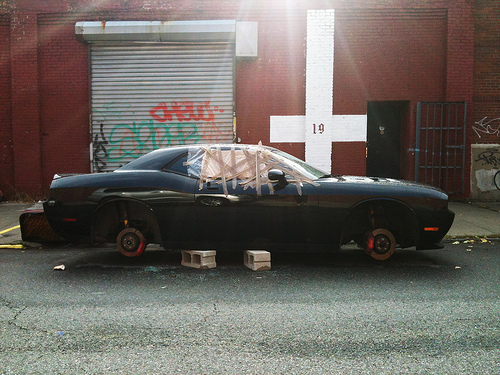In what The Wall Street Journal calls “a move that carries political risks,” House Speaker John Boehner (R-Ohio) plans to bring his behemoth, car-centric, 1950s-style transportation bill to the floor of the U.S. House of Representatives this week. Why is it risky? Because it’s a complete piece of junk.
The bill, which is soaked in suburban identity politics, would cut all designated funding for bike and pedestrian infrastructure, the Safe Routes to School program, and grants that have encouraged “complete streets” projects. If Boehner has his way, it would kill a longstanding rule that sets aside a portion of the gas tax to fund trains and buses and other public transportation systems. And to add insult to injury, it is loaded up with a long list of provisions that would pave the way for oil drilling offshore and in the Arctic National Wildlife Refuge.
So while an increasingly nervous-looking Boehner pushes this jalopy down the road, the rest of America is having a grand time making fun of him.
The New York Times got in an early shot last Thursday with an op-ed panning the bill:
The list of outrages coming out of the House is long, but the way the Republicans are trying to hijack the $260 billion transportation bill defies belief. This bill is so uniquely terrible that it might not command a majority when it comes to a floor vote, possibly next week, despite Speaker John Boehner’s imprimatur. But betting on rationality with this crew is always a long shot.
The Detroit Free Press jumped in on the action the same day:
The current federal transportation law expired more than two years ago. Since then, congressional gridlock has put the bill through eight extensions … Still, as bad as the inept inaction of Congress has been, a new House Republican plan that would remove mass transit money from the shelter of the Highway Trust Fund is even worse.
Not to be left out, The Sacramento Bee chimed in from the West Coast:
If [Republican leaders] have their way, the nation’s transportation network will take a giant step backward to a “roads only” policy for dedicated funding.
Lest you think it’s just those lefty newspaper editors that hate this proposal, the ever growing list of opponents now includes conservative stalwarts such as the U.S. Chamber of Commerce and the Club for Growth. Transportation Secretary Ray LaHood, a former Republican congressman, told Politico, “It’s the worst transportation bill I’ve ever seen during 35 years of public service.”
Republicans in the House seem to be jumping ship in droves. ChicagoBusiness.com reports that GOP representatives representing suburban districts surrounding the Windy City now say they can’t support the bill.
The nonprofit Transportation for America, which led a nationwide call-in day, asking people to give their representatives a piece of their minds, tweeted that if the bill passes, “local community’s choice now becomes highways or highways? With a side of highways.”
Indeed, the only people aside from an increasingly isolated House leadership who seem to support the proposal are the folks at the American Highway Users Alliance, a nonprofit that claims to be “THE voice of highway users including motorists, RVers, truckers, destination travelers, and others whose business depends on highways.”
The group is particularly fond of language in the bill that would squash “expensive, time-consuming” environmental reviews of road projects, and cut funding for mass transit out of the Highway Trust Fund, paid for by the gas tax. “The attention given to the National Highway System reflects a back-to-the-basics approach to the federal program,” President and CEO Greg Cohen said in a press release.
Back to the bad old days is more like it — and that’s a shame. Roxanne Blackwell, the federal government affairs manager with the American Society of Landscape Architects, made a strong case a few months back about why we need a new transportation bill right now:
Congress passed the last omnibus transportation bill, SAFETEA-LU, in 2005 and has “kicked the can” down the proverbial street by merely extending the measure multiple times since its first expiration in 2009. But now Congress’ dawdling on the issue is accruing a significant price tag for the nation. A recent report by the American Society of Civil Engineers calculates that “the cost of failing to invest more in the nation’s roads and bridges would total $3.1 trillion in lost GDP growth by 2020. For workers, the toll of investing only at current levels would be equally daunting: 877,000 jobs would also be lost.” Already, the report found, that “deficient and deteriorating surface transportation cost us $130 billion in 2010.”
The proposals now coming out of Congress, Blackwell writes, are leading us down a road to nowhere.
Where is it leading Boehner? It looks like he’ll coast to reelection this fall; the Democrats haven’t even fielded a candidate to oppose him. But with a track record like this, one wonders if his fellow Republicans might find a more able leader. If this bill shows one thing, it is that Boehner has a knack for driving the federal government directly into the ditch.





